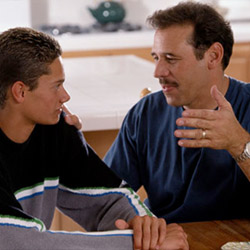Power struggles with kids. You see them everywhere. Frustrated parents. Out of control kids. Yikes!
One of the first things I tell parents is, “Any control you have over your child, is an illusion.” Most parents of teenagers know this…but try to control their kids anyway. One of the next things is, “Do not engage in a power struggle with your kids because you will never win”…not that we want to have a win/lose relationship with our kids. The harder you try to control your teen, the more they will resist and the more their behavior will escalate.
What to do?
1. Get really clear about your boundaries. Know when you need to take a stand…and when you can let it go.
2. Remember that the only person that you have control over is you.
3. Stay calm and rational. When you “lose it” you can’t help your kids “find it”.
4. Tell them what they are doing. You do not want to shame or embarrass them. You only want to help them be aware of what they are doing. “Do you realize that you are yelling (swearing, being disrespectful)?” Have you ever noticed that when YOU get upset you begin to raise your voice…sometimes without even noticing?
5. Tell them what YOU will/won’t do. This is NOT a threat or ultimatum. This is not a power play on your part. This is you letting them know (stating…”just the facts ma’am”) where you stand. The key here is your tone of voice. Let them know, “I will not be in conversation with you when you are yelling (swearing, being disrespectful) at me. This conversation is over for now.”
6. Give them a way back. Always let them know what you want from them and how they can re-gain connection. “We can talk when you are ready to have respectful conversation.”
7. Re-engage ASAP. This means that if they are immediately ready to have respectful conversation, you are too. The more quickly you are willing to re-engage/re-connect with them, the more effective this is. The message is “I love you. What you have to say is important to me. I want respectful interaction with you.” If you get angry, upset, or decide to “teach them a lesson” and make them wait, you turn this into a “punishment” instead of a “discipline” (opportunity to learn.) As a discipline, your kids will learn to self-correct.
8. Move forward. Don’t go back or ask, “Are you finally going to be respectful?” Never say, “I told you so”, or “Now isn’t that better”, or “If you had been respectful in the first place…” Unless your goal is to elicit eye-rolling.
9. Acknowledge ~ briefly. Always let kids know what you like, but don’t go overboard. Be sincere. “Thanks. I enjoyed our conversation.”
10. Always treat kids with the same respect you want to be treated with.
11. The shortcut. If this is a chronic problem, after the first few times, go straight to step #5 and proceed from there.
For more helpful tips and strategies, check out “Upcoming Workshops”.


